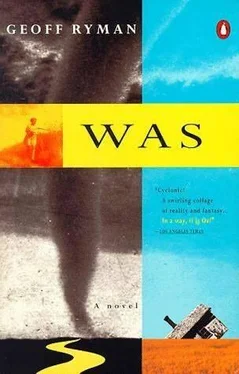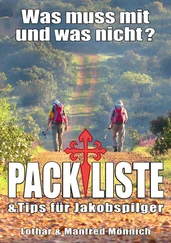Maybe I'll just walk through these fields the rest of my life and no one will find me. I'll wear corn leaves or cobwebs, and I'd build a sod house so far underground that they'll plant the corn right over it. And I'll sit in my house and hear the plows go overhead and laugh. I'd rock back and forth and have the gophers in for dinner.
But it was time to move on. Dorothy began to walk again, reeling as if drunk. She stumbled on the baked clods of earth that were as hard as stone. The sun went behind a cloud and stayed there.
Did she really want to walk to Wichita? Was there anything else she could do? She could try to find her father and live with him. She didn't know his first name. Only Gael. And that may have been made-up. Gaelic to Gael. He was Irish and an actor, and she wouldn't know him if she saw him. And he would not know her. He was probably dead, or in New York.
Dorothy came to the end of Uncle Henry's fields. There was a screen of leaves between her and the end of her known world. The sky got darker. There looked like being a storm. She would have to walk through rain and mud.
And suddenly she hid her face and wept. What was she going to do in Wichita except starve and beg and get dirty and smelly and used? Who did she know in Wichita? Who did she know anywhere? No one in Manhattan, where people looked straight through her. No one in the only place she could remember living. All Dorothy needed was extreme cleverness, and fearlessness, and love and a home, and she had none of those things. Dorothy needed magic. She needed some magic spell that would change her, give her different clothes, a clean face. She needed magic to scoop her up and drop her down in Wichita as a famous actress. She dreamed of being rich, of taking the train, of being met by carriages, of wearing pretty clothes and having doormen greet her.
There was no way out. No way back. She kept walking. She began to have another fantasy, that she was walking backward. She was walking backward through the years, and she was going to walk back home, to St. Lou before the diphtheria, to find her mother and father waiting for her, in the home she did not remember, away from Is, into the land of Was.
She pushed aside the last of the corn leaves and found a pasture of sunflowers.
They were wild, multistemmed with tiny yellow blossoms. They bobbed in a gathering breeze. They looked like a field of lamps. Dorothy stepped down from the barbed-wire fence, her adult dress held up around her ankles.
She ate the sunflower seeds, like the Indians did when they had lived in a place they called Blue Earth. If only there were Indians, real Indians that she could go and live with.
Then she heard a giggle under the leaves.
High-pitched, as if the gophers had acquired human voices.
"Hello?" she asked. "Hello?" She crouched, looking under the leaves, thinking to see children. The Jewells had children. She remembered them. One was small and hard and jealous. What was his name? And the other one was tall and shambling. A scarecrow on a Sunday. Would they have yellow sunflower faces? They would have sunflower faces. She looked but couldn't find them.
"Hello?" she called again, chuckling kindly, so they could hear she meant no harm. Then she thought: Were the sunflowers laughing? And then she heard deep voices.
Wichita ta ta
Wichita ta ta
It was a chant.
Wichita ta ta
Wichita was an Indian name, it was the name of the tribe of Indians the white adults had pushed aside, marched into the desert so that they died. But some of them escaped. They had stayed in Kansas, to live secretly under the cornfields. They had finally, finally come out to dance.
Wichita ta ta
She saw them, under the sunflowers. They were tiny brown men no taller than her knees. They were naked except for the feathers of birds and they were slightly wizened, like children that never grew up, or adults who had decided to stay children. They danced in a circle, chanting. They were Indians who had won. They were the Indians of Oz.
Wichita ta ta
Topeka
Manhattan
Ha ha
Tan tan
The gophers were standing in a ring to watch. There was a slight change to the sound.
Wichito to
To to
TopekaWichito to
To to
Toto
And suddenly she heard a dog bark, far away.
All the sunflowers began to bob and bend in a gathering wind. There was a low animal whine from all around her. The wind plucked at her adult clothes and there seemed to be smoke. It trailed across the ground, between the flowers, over her shoes. Smoke from Indian fires? The air was full of dust and smelled suddenly of soil. The chant went on: Toto, Toto.
Suddenly, all the sunflowers broke free. They rose up, leapt into the air, and spun away as Dorothy had spun.
Wichita to
Topeka
The sunflowers spun smiling all around her, like the scythes of her hands. There was a blast of wind and dust. Dorothy's dress was whipped about her legs. It spun around her like a sheep caught in barbed wire. The dust was flowing now like a wide thick river. She was standing in the middle of it. Dust blew up into her eyes, stinging, she had to look away.
The dust was making her weep. The Indians kept chanting. She let her eyes water, to clear them, and when she opened them again, the whole of the field had risen up into the air, spiraling sunflowers, a plowed line of dirt drawn up into the air like soda through a straw. Still blinking, Dorothy looked up and saw it.
A twister. A twister.
And Dorothy froze. She went stock-still.
The twister loomed over her as huge as a man, spinning, turning, trawling its vast single foot lazily across the fields.
Dorothy thought she was calm. I made it, she thought. It came out of me. I spun and spun and I made it, as twisted as I am. And now it's coming for me. There is no place to hide. I ran away, and there was no escape. I ran into the fields, the one place you are not supposed to go in a cyclone, and I can't go home. You need to have a burrow in the earth. And that was what I wanted. Somewhere to live hidden. And now I'm going to die. I'm going to die.
It seemed to her suddenly to be the way out, to let the wind blow her away, like dust, to somewhere else.
She watched the twister as it came, passive as she had been before Uncle Henry. She waited as if for a lover. She was unable to move.
Then suddenly there was a bright, fierce little bark, a sound like shattering mirrors. Dorothy looked down, and there was Toto, bouncing with rage, turning around and around in the dust.
Toto, she tried to say, but the wind pulled the breath out of her lungs.
He was full of life and anger. You don't want to die! he seemed to say. Run!
Dorothy broke free. She screamed and covered her eyes. With a thrill of self-love, she began to run.
Toto ran with her, yipping, on tiny terrier legs, circling her ankles. She ran blindly, arm across her tender eyes.
In a twister, you set the horses free, free to run. Some know to run away from the twister. Some run into it, and no one knows why. Some want the twister, betrayed by something inside them.
Toto shepherded her. He drove her away from it, toward the hills, out of the valley. She ran with long hungry strides over the broken earth toward shelter, the Aikens' house. She ran listening for the howl of wind in a peach orchard. The twister turned and changed shape, the blast sucking one way and then exploding in another. Our Father who art in Heaven.
The cyclone was behind her, then in front of her, dodging like a clever, nasty boy weaving his way toward a touchdown. Toto barked. This way! This way!
Hallowed be thy Name.
Читать дальше












